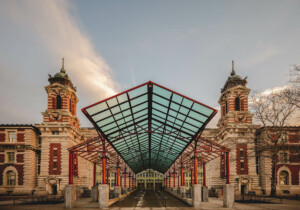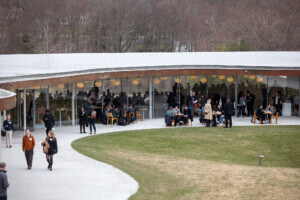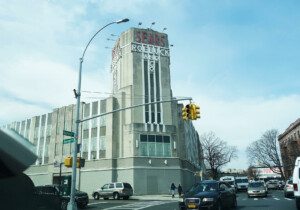While there are many key locations associated with Martin Luther King Jr., Connecticut usually doesn’t top the list for most armchair. But those familiar with the formative years of the legendary orator and Noble Peace Prize-winning social activist know that the Nutmeg State played a key role in forming a young King’s worldview, leading him to a life of public service.
Now, thanks to the residents of Simsbury, a town in Hartford Country, and the Trust for Public Land, King’s oft-overlooked Connecticut connections will be preserved for generations to come.
As a 15-year-old freshman at Atlanta’s Morehouse College, King spent the summer of 1944 working as a farmhand at the Cullman Brothers shade tobacco farm in Simsbury as part of a tuition fund-raising seasonal employment program. In 1947, he ventured north again alongside a group of fellow students to work those same tobacco fields.
These summers in Connecticut were eye-opening for King, to say the least, as it exposed him for the first time to a world outside of the racially divided Jim Crow South. When not working the fields during the day, King and his fellow student laborers, who were put up in a dormitory on the farm, dined in unsegregated restaurants in town and partook in other activities unimaginable back in the South. Although Connecticut was still rife with inequality and prejudice at the time, New England was a world away from Georgia and these summers afforded King and his fellow classmate-laborers with basic freedoms that they had never known before.
“It was a crucial time of his life,” said Dr. Clayborne Carson, the Martin Luther King Centennial Professor of History at Stanford University and founding director of the university’s Martin Luther King, Jr. Research and Education Institute, in an article for the Trust for Public Land in January of this year. “It was the first time he was out of the South for an extended time. So he really experienc[ed] places where southern-style segregation didn’t exist. And that was impressive for him.”
While Simsbury’s shade tobacco farms have long since closed, the 288-acre parcel where King worked in the 1940s, known as Meadowood, remains. Until recently, the overlooked but historically significant site was threatened with private development in the form of a 300-home subdivision. Now, it will be protected and preserved thanks to proactive measures taken by the Town of Simsbury and the Trust for Public Land. As detailed in a joint press release, 130 acres of the old farm will be set aside for public recreational access while another 120 acres will be preserved as working farmland. An additional 24 acres will be set aside for municipal use by the Town of Simsbury. The remaining 2 acres will eventually be transformed into an open-air museum of sorts with interpretive elements telling the story of King’s time in Connecticut’s Farmington Valley as a college student.
As noted by the Associated Press, it was during these summers that King, who was later ordained as a minister at Ebenezer Baptist Church in 1948 at the age of 19, ultimately decided to attend Crozer Theological Seminary in Pennsylvania. As King explained in his application to the seminary, he “felt an inescapable urge to serve society” during the summer of 1944. “In short, I felt a sense of responsibility which I could not escape.”
There are also plans to eventually rehabilitate the existing historic tobacco sheds at the site (the three-story dormitory building was burned to the ground during a 1984 exercise by the town’s volunteer fire department) and, most likely, include Meadowood as a site on the Connecticut Freedom Trail, a statewide network of over 140 Black cultural heritage sites that was first launched in 1996.
Per the Trust, only 2 percent of sites listed on the National Register of Historic Places focus on the Black American experience, a “collective oversight” that the San Francisco-headquartered conservation nonprofit said, “deprives all Americans of a full understanding of the history of our nation.”
The movement to protect and preserve Meadowood first began as a grassroots community petition and later evolved into a referendum ballot. In May of this year, Simsbury voters overwhelmingly supported the measure’s passage and, in turn, authorized the sale of the old farm for $2.5 million. A trio of state agencies—the Connecticut Department of Energy and Environmental Protection, the Department of Agriculture, and the State Historic Preservation Office—along with the U.S. Fish and Wildlife Service, the George Dudley Seymour Trust, and a multitude of foundations and individuals provided an additional $4 million in funding to protect the site. The finalization of the sale was announced on October 8.
As noted by the Trust for Public Land, a long-time effort to erect a memorial to King at the Simsbury Free Library, one that commemorates the civil rights icon’s pivotal Connecticut summers, was also finally realized earlier this year on King’s birthday.
“To any person driving down Firetown or Hoskins Roads, Meadowood is a recognizable remnant of Connecticut’s impressive tobacco industry, but what is not readily apparent are the consequential experiences of the people that lived and worked there,” said Cathy Labadia, Deputy State Historic Preservation Officer for the State of Connecticut, in the aforementioned joint press release. “Preserving this place allows current and future generations to discover the past, reflect on the present, and perhaps also inspire the future.”
Now that Meadowood is protected public land, “community-generated ideas” are being considered for the sprawling site including nature trails, youth sports facilities, wildlife viewing areas, and historical/educational interpretive spaces.











